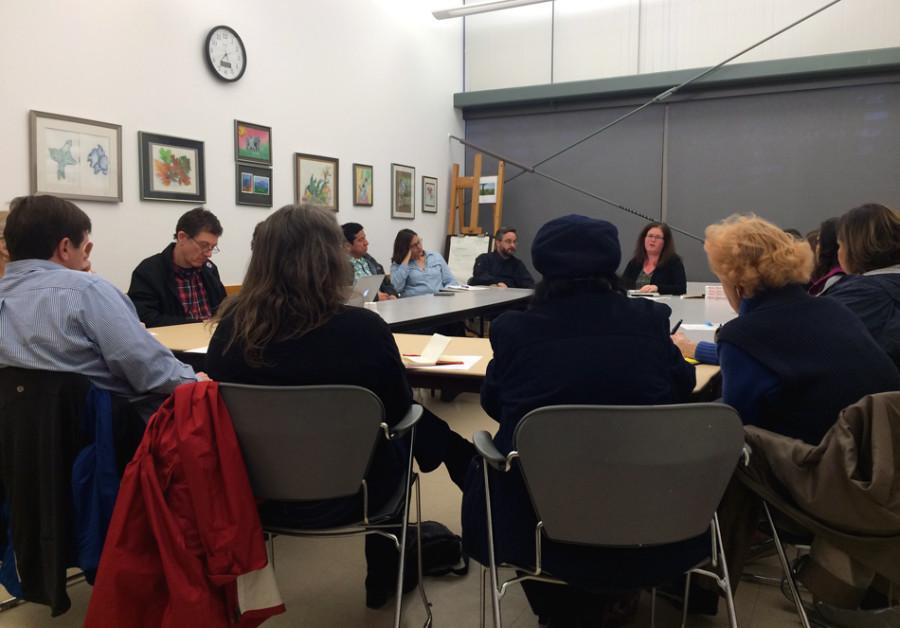Evanston parents, teachers discuss potential detriments of PARCC testing
Marissa Page/The Daily Northwestern
Julie Fain, an activist involved with More Than a Score Chicago, speaks to a group of Evanston parents and teachers about opting out of PARCC testing. More Than a Score opposes the amount of time, resources and manpower dedicated to administering standardized testing in CPS.
March 31, 2015
Parents, teachers and community members met Tuesday evening to discuss the possibility of children enrolled in Evanston school districts opting out of future state-mandated PARCC testing.
About 20 to 25 people gathered at the Levy Senior Center, 300 Dodge Ave., to attend the forum, which was organized by parents involved in the anti-standardized testing group Park the PARCC Evanston. Several of the parents in attendance had already opted their children out of the first round of PARCC testing, which took place throughout March.
PARCC testing, which stands for Partnership for Assessment of Readiness for College and Careers, is required by the Illinois State Board of Education and is meant to gauge the effects of Common Core standards in language arts and math.
The superintendents of both Evanston/Skokie School District 65 schools and Evanston Township High School said at a joint State of the Schools address in January that implementing PARCC testing requires a surplus of time, money and manpower.
A bill has been presented to the Illinois General Assembly that aims to facilitate the process for students to opt out of taking the test. However, most parents at the meeting said they have run into little resistance in opting their children out of PARCC.
“It was not a big deal opting my kids out,” said Sophie Degener, a former District 65 teacher with children at Washington Elementary School, 914 Ashland Ave., and Nichols Middle School, 800 Greenleaf St. “We were treated very respectfully in the process.”
Julie Fain, a Chicago-area activist and Chicago Public Schools parent involved with anti-standardized testing group More Than a Score Chicago, presented background at the meeting on the fight against PARCC in the Chicago area.
“We found instructional time was being taken away for testing,” Fain said. “We saw a lot of money going into developing testing, purchasing Chromebooks, testing materials and booklets. They are creating a culture in the school where the test is a measure of how kids are doing, instead of what they’re doing in the classrooms.”
A major area of concern for Evanston parents was the possibility that, if there was not a high enough turnout for PARCC testing in District 65 schools, the district’s Title I federal funding could be cut. The state has threatened to withhold funds from districts that refuse to administer PARCC.
Fain wrote off the threat that low enrollment numbers could lead to funding deficits as “fearmongering,” saying nothing of the sort has occurred at any of the Chicago schools with lower PARCC turnouts.
“Even if they did take the money away, I would still think we’re doing the right thing,” District 65 parent Sandra Sullivan-Dunbar said.
Still, some parents, such as Marjorie Fujara, expressed some trepidation about opting out.
“As a parent with a special needs child entering kindergarten, I am petrified that we might lose that funding,” Fujura said. “In these cases, special education funding is one of the first things to be cut, along with the arts and physical education.
Although the intention of PARCC testing, according to its website, is to establish whether students are on track to succeed in college, Fain said she believes standardized testing simply wastes time and money on gathering redundant information.
“Ask your teachers: did this test tell you anything you didn’t already know?” Fain pressed. “And it’s no.”
Email: marissapage2018@u.northwestern.edu
Twitter: @marissahpage



